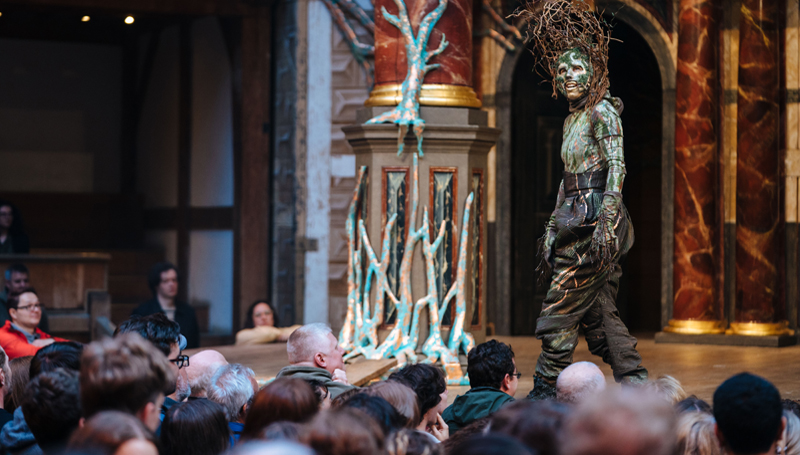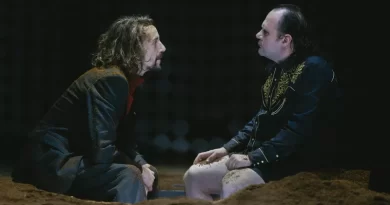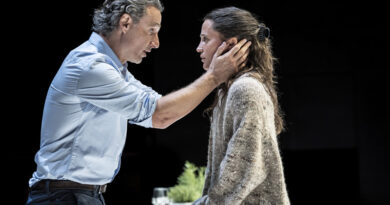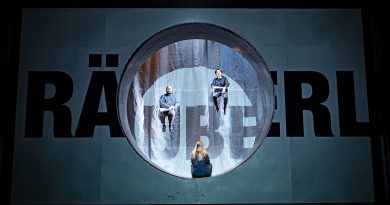“A Midsummer Night’s Dream” at Shakespeare’s Globe
Jeremy Malies on the Southbank
24 May 2023
On her own website, Pentabus Theatre artistic director Elle While is quick to describe her work as “text-based”. And that is the case here although there is nothing formulaic about this excellent A Midsummer Night’s Dream; it propels us through layers of reverie and mysticism in an original way without taking a single liberty with the play as written.
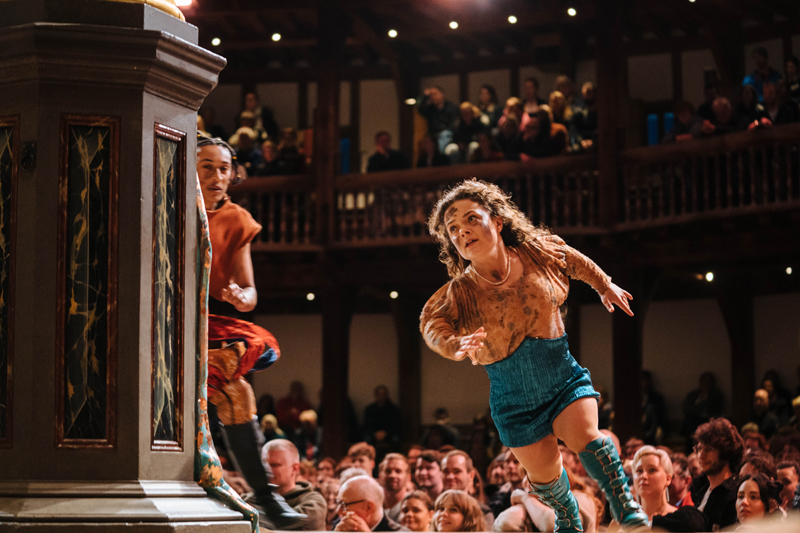
Francesca Mills as Hermia.
Photo credit: Helen Murray.
I worried that given the disparity in height between Francesca Mills as Hermia and Isobel Thom as Helena, the sight gags might be overdone and become laboured so derailing the general momentum. But While lets the few moments of physical humour emerge naturally from the verse, an aspect that makes the evening taut and slick. Dialogue is king here.
The lovers maintain the uniform high standards. Sam Crerar as Lysander is successful in convincing us that there is a brief backstory with Mills’s Hermia, who in turn is amusingly coy as she measures out the distance between them as they bed down for the night, secretly hoping that her lover will encroach a little. I never got my head around Thom’s goth costume as Helena. Thom is outstanding in the signature scene (for me at least) when they become befuddled by the realization that they have gone from being totally unloved to being the object of ardent pursuit by both Demetrius and Lysander. The comedy has an undercurrent of Thom suspecting that they are the subject of a sinister conspiracy.
A stand-out is Sarah Finigan in three roles: she uses all her technical armoury to portray Egeus, Snug, and Peaseblossom. It’s as Egeus that she truly excels when, having initially been the most judgemental of the aristocrats, she is the first to be seduced by the interlude that the Rude Mechanicals have knocked together. And comic it is, drawing not just on the excellence of the actors but witty props by Emma Hughes including wonderful headgear for Moon, an evocative Wall, and a wirehaired terrier on whom I should like to bid when the run is over. There is no central conceit that binds together the Rude Mechanicals and their play. But perhaps the Globe is not the place for this. I’ve seldom found them so charming and, more than any production I have ever seen, the amusement from their ludicrous offering for the theatre competition appears to be a spontaneous happening rather than something that has been imposed from outside.
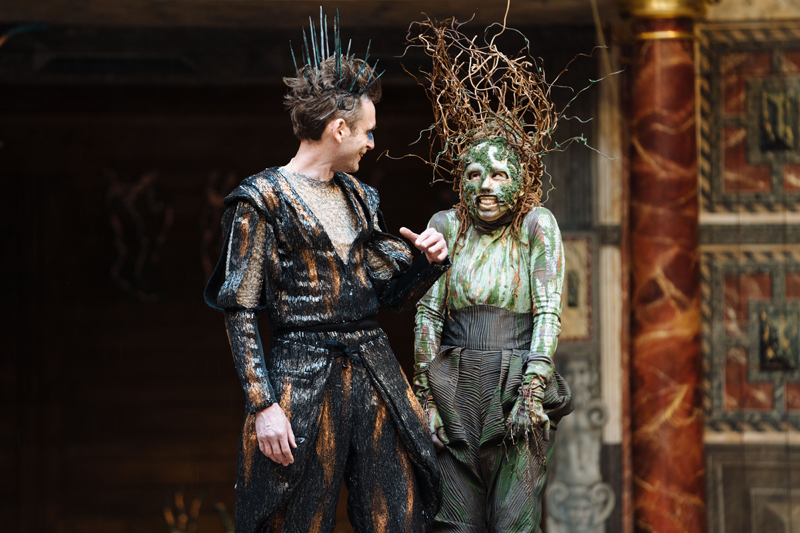
Jack Laskey and Michelle Terry.
Photo credit: Helen Murray.
So, what of Bottom’s dream and the engine of the drama? It’s wonderfully tender and linguistically precise. Titania (Marianne Oldham) in a bower that is little more than a hammock seeks refuge from the bullying of Oberon (Jack Laskey) and his particularly vicious comments about the changeling child. Bottom is played by Mariah Gale, a Shakespeare specialist who has worked before at both the Globe and the RSC. Costume designer takis (and While) give her no phallus and Gale doesn’t reference it visually as she reflects on her dream, nor does she make any great attempt to be androgynous. It even occurred to me that her tryst with Titania may be a lesbian coupling. It’s a tender act of congress whatever, and I melted as the willowy Oldham intones: “Sleep thou, and I will wind thee in my arms.”
Cyan-coloured tree limbs snake over the wings and balcony in a stage design by Wills (Paul Williams). The trees are metallic, so the effect is hardly sylvan and more fossilized or even petrified. It’s certainly not an Athenian wood in terms of design and the whole undertaking is cheerfully loose as to place. Anne Odeke, who doubles resourcefully as Hippolyta and Cobweb, uses a cockney lilt as she turns the constant arguments with Theseus (Laskey again) into a sustained verbal dogfight.
Over the years I’ve seen the spirits in this play portrayed as Celtic goblins, mischievous skinheads, ballerinas, acrobats, alcopop-fuelled clubbers, LSD-tripping hippies, pre-Raphaelite models, and Sumatran shadow puppets. Here, as with the Mechanicals, the fairies appear to simply belong. I had the impression that they may have been conjured up by the original minimalist and plaintive instrumental music of James Maloney who uses a band of five involving brass, woodwind, and even a thunder sheet that seems to summon the fairies as if the beats spell out a code.
I always make a point of not opening my programme until I leave the theatre and had no idea that artistic director Michelle Terry was playing Puck. takis had disguised her completely with a mask and a headdress of tree stalks that reminded me of the Jack o’ the Green English folk custom. This is a mercurial all-seeing Puck who you think might indeed put a girdle round the earth in 40 minutes. Terry injects rich comedy into the scene in which she is upbraided by Oberon for not distinguishing between Demetrius and Lysander. As the venue’s artistic supremo revealed herself and the applause swelled, she gave one knowing smile that I interpreted as: “Yes, I’ve just done something rather special!”
I note that there will be performances that start at a minute to midnight and am tempted to return. The line “Ill met by moonlight, proud Titania” comes to mind. But no, these sessions under the stars will work. Never over-reverent, Elle While has achieved an alchemical reaction with an already magical play.
.
.
~

